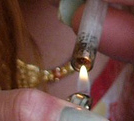Drug pipe
(Redirected from Love rose)
Drug Pipe[edit | edit source]
A drug pipe is a device used for the consumption of various substances, typically illicit drugs. These pipes are designed to facilitate the inhalation of smoke or vapor produced by heating the drug. Drug pipes come in various forms and are often associated with specific substances, such as methamphetamine, crack cocaine, and other smokable drugs.
Types of Drug Pipes[edit | edit source]
Drug pipes vary in design and material, often tailored to the specific drug they are intended to be used with. Common types include:
Methamphetamine Pipes[edit | edit source]
Methamphetamine pipes are typically made of glass and feature a bulbous end where the drug is placed. The bulb is heated, causing the methamphetamine to vaporize, which is then inhaled through the pipe's stem. These pipes are sometimes referred to as "bubble pipes" due to the shape of the bulb.
Crack Cocaine Pipes[edit | edit source]
Crack cocaine pipes are often made from glass or metal and are designed to withstand high temperatures. The pipe usually consists of a straight tube with a small bowl or chamber where the crack cocaine is placed. Users often employ a screen or filter to prevent the drug from being inhaled directly.
Cannabis Pipes[edit | edit source]
While not always associated with illicit use, cannabis pipes are another common type of drug pipe. These pipes can be made from a variety of materials, including glass, metal, and wood. They typically feature a bowl for holding the cannabis and a stem through which the smoke is inhaled.
Usage and Risks[edit | edit source]
The use of drug pipes is associated with several health risks, primarily due to the nature of the substances consumed. Inhalation of drug vapors or smoke can lead to respiratory issues, addiction, and other health complications. Additionally, sharing drug pipes can increase the risk of transmitting infectious diseases such as HIV and hepatitis.
Legal and Social Implications[edit | edit source]
The possession and use of drug pipes are often subject to legal restrictions, as they are considered drug paraphernalia. Laws vary by jurisdiction, but many regions impose penalties for the possession of drug pipes, especially when associated with illicit drug use.
Socially, the use of drug pipes is often stigmatized, contributing to the marginalization of individuals who use drugs. This stigma can hinder access to healthcare and support services for those struggling with substance use disorders.
Harm Reduction Strategies[edit | edit source]
Harm reduction strategies aim to minimize the negative health and social impacts associated with drug use. These strategies may include providing access to clean drug pipes to reduce the transmission of infectious diseases, offering education on safer drug use practices, and facilitating access to addiction treatment services.
Related Pages[edit | edit source]
Search WikiMD
Ad.Tired of being Overweight? Try W8MD's NYC physician weight loss.
Semaglutide (Ozempic / Wegovy and Tirzepatide (Mounjaro / Zepbound) available. Call 718 946 5500.
Advertise on WikiMD
|
WikiMD's Wellness Encyclopedia |
| Let Food Be Thy Medicine Medicine Thy Food - Hippocrates |
Translate this page: - East Asian
中文,
日本,
한국어,
South Asian
हिन्दी,
தமிழ்,
తెలుగు,
Urdu,
ಕನ್ನಡ,
Southeast Asian
Indonesian,
Vietnamese,
Thai,
မြန်မာဘာသာ,
বাংলা
European
español,
Deutsch,
français,
Greek,
português do Brasil,
polski,
română,
русский,
Nederlands,
norsk,
svenska,
suomi,
Italian
Middle Eastern & African
عربى,
Turkish,
Persian,
Hebrew,
Afrikaans,
isiZulu,
Kiswahili,
Other
Bulgarian,
Hungarian,
Czech,
Swedish,
മലയാളം,
मराठी,
ਪੰਜਾਬੀ,
ગુજરાતી,
Portuguese,
Ukrainian
Medical Disclaimer: WikiMD is not a substitute for professional medical advice. The information on WikiMD is provided as an information resource only, may be incorrect, outdated or misleading, and is not to be used or relied on for any diagnostic or treatment purposes. Please consult your health care provider before making any healthcare decisions or for guidance about a specific medical condition. WikiMD expressly disclaims responsibility, and shall have no liability, for any damages, loss, injury, or liability whatsoever suffered as a result of your reliance on the information contained in this site. By visiting this site you agree to the foregoing terms and conditions, which may from time to time be changed or supplemented by WikiMD. If you do not agree to the foregoing terms and conditions, you should not enter or use this site. See full disclaimer.
Credits:Most images are courtesy of Wikimedia commons, and templates, categories Wikipedia, licensed under CC BY SA or similar.
Contributors: Prab R. Tumpati, MD



